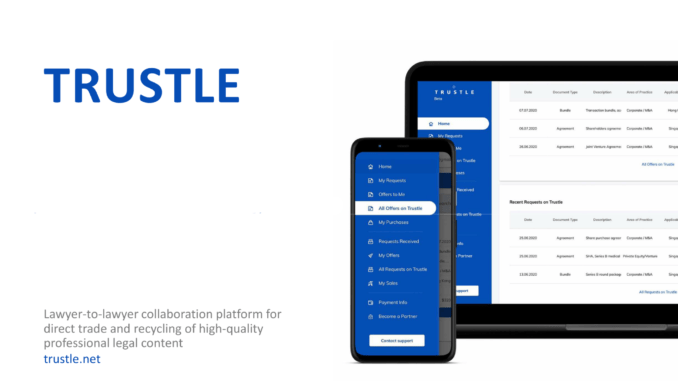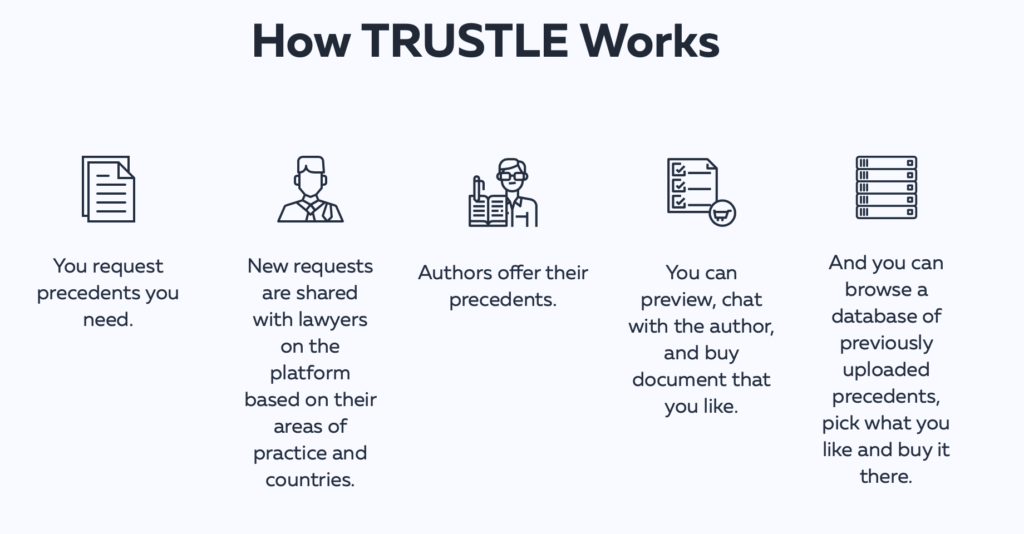
Trustle is a new marketplace for precedents. At its core Trustle is designed to allow a lawyer to make a precedent purchase request to the international community of lawyers signed up to the platform. If no-one has what is required for sale, there is also a library of precedents that have already been listed that you can turn to, (see below).
The hope is that this will widen knowledge-sharing across the global legal community, and provide lawyers who participate with an additional revenue stream. If successful it could reduce the reliance on some of the larger knowledge companies, such as Thomson Reuters and LexisNexis.

All the documents that are put on sale are cleared of any privileged and confidential information. Also by default, Trustle keeps all requests and offers anonymous, unless the buyer and the seller want to disclose their identities. The company takes a commission on each sale.
And, it’s a lively market segment already. Aside from giant companies such as Thomson Reuters and LexisNexis selling a wide range of contractual/precedent information, we also have Pandadocs and Lawinsider, as well as PartnerVine, among others around the world, each with differing models and approaches to knowledge selling.
Artificial Lawyer spoke to Singapore-based founder, Vladimir Vereskoun, who used to be a lawyer at US firm Baker Botts, about how he hoped his approach will make a dent in the market.
Vereskoun’s key point is that by his estimate: ‘Publicly available precedents are just 1% of what is drafted globally.’
Also, ‘most drafted precedents are never used more than once. However, when you need a good precedent quickly, finding one becomes a struggle’.
Moreover, precedents from public listing databases (such as the SEC’s EDGAR) are ‘overcomplicated, require a major clean-up and mostly relate to US transactions’.
His response is to allow lawyers to go to the Trustle market to ask for exactly what they want, relevant to their specific jurisdiction and use case, and in return help a lawyer who has done exactly the same kind of work before to make some additional money from that effort.
‘The market is changing rapidly right now and the value of precedents as ‘sacred invaluable knowledge of the major firms’ is massively diluted. Our target sellers more likely work at ALSPs and medium to small law firms,’ he explained.
He also stressed that the reality is that although you might find a global firm not being keen for its partners to be selling their new precedent documents, on a global scale these giants are a small fraction of all law firms.
‘The remainder of the market are a myriad of smaller firms and solo lawyers. Many of them have worked at the top firms before,’ he explained.
I.e. there are potentially thousands of experienced lawyers out there who may see something like Trustle as a great opportunity to generate additional income – and share knowledge in the process.
The platform has now completed a Beta phase and they are extremely interested in feedback from as many lawyers as possible, Vereskoun added.
So, what do you think? Check it out and let Vereskoun know.
Very interesting. Good luck Vladimir and the team.
We recently launched another lawyer-to-lawyer document marketplace, enabling lawyers and law-firms to license and share precedents directly with other lawyers around the world. The platform has beta tested in several Asian markets, and is now starting international roll-out. Lawyers from over 20 countries have already joined the platform. Check out http://www.lexub.com if you’re interested.
Can you clarify what you mean by precedent? In the US, a precedent is a legal court decision, it’s not something a lawyer would draft. In this piece you seem to be using it more broadly, do you mean legal memoranda in the US?
[Editor] believe the company means ‘precedent documents’ in general, rather than a court decision. P.S. they are based in Singapore.
Hi Michael,
We mean precedent documents in general. There is a detailed definition of what we mean by a ‘precedent’ on top of the landing page at https://trustle.net.
In a nutshell, these are documents, forms, or other deliverables in previous matters or transactions that are generalized, impersonalized, and cleared of any specific details to be used on substantially similar matters. Most lawyers start drafting with some kind of boilerplate and the closer this boilerplate is to a particular matter, the less work is to be generally done.
This meaning is widely used in international law firms and major law schools. You can often see emails and messages to colleagues with requests for precedents for a particular matter. In fact, this process is replicated on Trustle.
Court precedents is the commonplace meaning of course, but there is this secondary meaning you must have likely heard many times.
Many thanks.